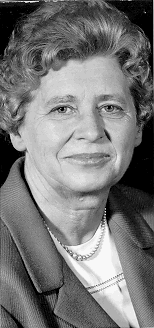

 The University of British Columbia has lost one of its most distinguished members.
The University of British Columbia has lost one of its most distinguished members.
Prof. Emeritus Margaret Ormsby, who died Nov. 2 at the age of 87, legitimized the study of British Columbia history as a scholarly endeavour. She had already taught in the UBC Dept. of History for a dozen years when she was commissioned to write a provincial history to commemorate the 1958 centennial. Four decades later British Columbia: A History remains the fundamental starting point for thinking about the province.
To a remarkable extent Ormsby's centennial history reflected her own life circumstances. Of Canadian Scottish and Anglo-Irish descent, she grew up in the Okanagan Valley at a time when, so she wrote, genteel fruit farmers "maintained the standards of polite society in Victorian England." Families like hers, if only aspiring outsiders, were similarly imbued with a sense of community and a "feeling of cultural superiority" in the face of coastal boosterism, American crassness, and the excesses of Canadian parochialism. British Columbia was a special place deserving of a history all its own.
Encouraged by her parents, young Margaret left the Okanagan for UBC in 1926, where she obtained a BA in history, a teacher's training certificate, and in 1931 an MA in history. Armed with a scholarship, Ormsby went off to study medieval and American history at Bryn Mawr College in the eastern United States, where she received her PhD in 1937. While doing so, she worked for a year as an assistant in the UBC History Dept., but on graduation could not secure an academic position. So the newly minted Dr. Ormsby taught at a private high school in San Francisco until, in 1940, a war-time lectureship opened up at McMaster University. In 1943 the UBC History Dept. hired her, again as a temporary replacement, but she held on, became a professor by 1955, and served as department head from 1964 to her retirement in 1974 back to the Okanagan Valley.
Throughout her career Margaret Ormsby lived a double, indeed a triple, life. Formed as an academic within the historical mainstream, she pursued her first love of British Columbia and Okanagan history in her writing. In the fall of 1958, just as British Columbia: A History was receiving accolades, she was teaching, so a former student recalled, senior undergraduate classes of 50 to 60 students each in Canadian history and medieval history, honours seminars in philosophy of history and Canadian external relations, and likely also a course in American intellectual history. Her extensive publications examined the fur trade, colonial and provincial politics, agriculture, pioneer women, and Okanagan history. She also edited nine annual reports of the Okanagan Historical Society, essentially compilations of writing on local history.
The second, very important factor bifurcating Margaret Ormsby's career was gender. Female academics were few and far between, and she was never allowed to forget that she was a woman playing at a man's game. The Second World War facilitated her entry into the university, but only at its margins. She recalled how her work space at McMaster was a table in the women's washroom, the department head explaining that there were "no offices for female faculty." Ormsby headed the History Dept. at UBC during a period of rapid expansion bringing in a new generation of self-confident, sometimes brash academics unaccepting of "a iron-fisted woman," to quote the Ubyssey, with a penchant for hats and expectation of deference. "Women faculty were thought of as difficult," Ormsby once reflected, "but a woman had to be difficult in order to survive." She considered the only place where men and women were truly equal to be the UBC faculty club dining room.
Margaret Ormsby led the way, not only for the study of British Columbia history, but for women in the history profession and in the university more generally. In 1965 she became only the second woman president of the Canadian Historical Association, paving the way for Margaret Prang, her successor as head of the UBC History Dept., to become its third woman president a decade later. Ormsby was made a Fellow of the Royal Society of Canada in 1966, received honorary degrees from all four British Columbia universities as well as from elsewhere, and in the spring of 1996 was awarded the Order of Canada. She took a special interest in her female graduate students, and fondly recalled almost all their careers. Perhaps the greatest testimony to Margaret Ormsby's enduring influence was a group of young doctoral students of the 1990s launching a scholarship in her honor in British Columbia history, to which contributions are still welcome.